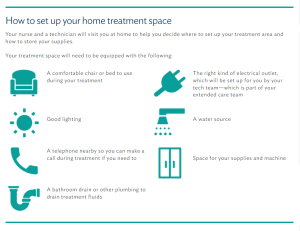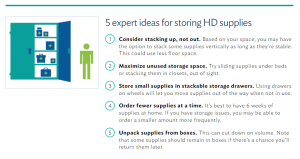Home hemodialysis ends. It always does, whether that person gets a transplant, changes over to in-center treatment or dies. Right now I should be mourning my loss but instead I am consumed by anger and disgust at the assault on the environment that home hemodialysis has turned out to be.
“Informed” Preparation
I can only address the policies of Fresenius. I have no reason to think other companies do things much differently.
I knew that home hemo would involve a lot of stuff. When Cesar evaluated our space for plumbing and provided his (always insightful) advice on setting up the room, he said that supplies would take up a considerable amount of space. By a “considerable amount of space,” he meant way more cubic footage than the closet contained.
I got that. The prospect was intimidating but I thought, “We have the space to sacrifice. This is my Dear One we are talking about. This is what he wants and what he wants is what I want.”
Obvious Costs
Medicare picks up the medical expenses of treatment but there are out-of-pocket costs. Our electric bill, for instance, escalated from $180 a month to $210. I also noticed a jump in the water bill.
And the trash.
Everything came in boxes and little boxes came in bigger boxes. Two, three, even four empty cartons headed to recycling weekly.
Each treatment required, at minimum, a set of cannulas (needles); a liter bag of saline; a contraption that goes into the Cycler involving plastic, tubing, a cylindrical filter, collectively called the “cartridge”; and masks, gloves, gauze pads, tapes, syringes, wipes and other bits of this and that. When I did bloodwork or administered medications, there were additional vials, syringes and whatnot. A SAK of dialysate, made twice weekly, lasted for two treatments, leaving behind a collapsed plastic bag. “Medical waste” went into a designated bin with a cover; all else went into a trash bag and out with the household refuse. We brought the medical waste basket to the dialysis center when it was full. I could not reuse them; it all went into the incinerator.
Every three months the PAK, the brain that controls the Pureflow, had to be replaced. This large black box is heavy as hell and includes an excessive number of replacement tubes, most of which go straight to garbage. Heaven only knows what exactly was in that weighty piece of junk I sent to the dump.
From Bad To Worse
In the last four or five months of Dan’s dialysis, Fresenius changed their shipping from monthly to every two months. Ironically, Fresenius recommends, on its website, that one rely on frequent small shipments to keep storage needs at a minimum. Fewer deliveries meant way more stuff each time. As Dan went into that catastrophic last couple of months, we had more supplies than ever before—and due to hospitalizations and then hospice, we used much less of it.
Refuse, Reduce, Reuse, Repurpose And Recycle: NOT!
None of what was left, not even the sealed boxes could be used. . All of it had to be destroyed. Even the centrifuge I used for the monthly bloodwork. What, there isn’t some science department in some underfunded public school that couldn’t use a centrifuge? Or some clinic on a Native American reservation? What about the scale, stethoscope and blood-pressure cuff? The abundant supplies of tourniquets and scissor clamps? There was no use for all those bags of saline? I am pretty sure there are medical centers all over the Third World that would be grateful for such material.
And the bundles of clean paper towels. And the absorbent sheets used to keep supplies clean as I laid them out. And the bottles of disinfecting liquids, the unused gauze pads, the tapes, the masks. I mean, it is criminal to dispose of all this stuff.
But that’s the system.
Profits To Be Made
Why? Is it because they have already made Medicare/Medicaid pay for the supplies and so cannot either take them back or put them to another use? Is it because it is easier and cheaper for them to destroy mountains of supplies and centrifuges and scales and thermometers and blood-pressure cuffs than pass them on to needy organizations?
I dunno. I am mad as hell, thought, that supporting my husband’s medical choices meant I participated in an ongoing assault on the environment.



